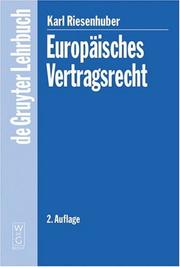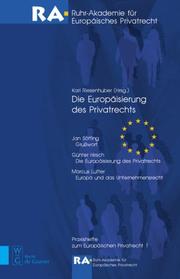| Listing 1 - 10 of 87 | << page >> |
Sort by
|
Book
ISBN: 9781780680804 1780680805 9781839701511 183970151X Year: 2012 Volume: 4 Publisher: Cambridge: Intersentia,
Abstract | Keywords | Export | Availability | Bookmark
 Loading...
Loading...Choose an application
- Reference Manager
- EndNote
- RefWorks (Direct export to RefWorks)
European employment law is becoming increasingly important. Its impact upon domestic law of the Member States in fields such as fixed-term employment contracts, collective redundancies or industrial action, is growing. This volume therefore covers the complete scope of European employment law: its foundations in EU primary law and its various sources in EU secondary legislation, as well as the growing body of case law of the European Court of Justice.00The book begins by providing an overview of the relevant fundamental rights, fundamental freedoms and competences of the European Union in the field of employment law. A systematic presentation of the conflict of law rules in European Employment Law then follows: the Rome I and Rome II-Regulations, the Posting of Workers Directive and the Brussels Regulation on the recognition and enforcement of judgements. Subsequently, the author focuses on individual labour law which, at the EU level, is principally composed of rules on non-discrimination, the protection of safety and health and working time; rules on atypical forms of employment (part-time, fixed-term and temporary agency work) and special groups of employees (mothers, parents, young people); as well as legislation concerning employment protection in situations of collective redundancy, business transfer and insolvency. This is followed by a discussion of collective labour law issues. Particular attention is given to the European Works Council and the rules on employee involvement in the European Company, the European Cooperative Society, and the European Private Company, and to employment law rules contained in the Directive on cross-border mergers.
Labor laws and legislation --- Travail --- Droit --- Employee rights --- europe --- arbeidsrecht --- EEC / European Union - EU -Europese Unie - Union Européenne - UE --- 349.1 --- 347.754 --- 334.151.52 --- 334.154.6 --- 332.11 --- 351.83 <4> --- -344.01094 --- Uh8 --- Employees --- Employment law --- Industrial relations --- Labor law --- Labor standards (Labor law) --- Work --- Working class --- Industrial laws and legislation --- Social legislation --- 351.83 <4> Arbeidsrecht. Arbeidswetgeving--Europa --- Arbeidsrecht. Arbeidswetgeving--Europa --- europa --- droit du travail --- Sociale wetgeving. --- Verhuur van diensten. Ondernemingscontract. Arbeidscontract. Dienstcontract. Collectieve arbeidsovereenkomsten. --- betrekkingen tussen werknemers en werkgevers (EG). --- Sociaal recht in de Europese Gemeenschappen. --- Arbeidscontract. Collectieve arbeidsovereenkomsten. --- Legal status, laws, etc. --- Law and legislation --- 344.01094 --- Labor rights --- Rights of employees --- Civil rights --- Employee rules --- Arbeidscontract. Collectieve arbeidsovereenkomsten --- betrekkingen tussen werknemers en werkgevers (EG) --- Sociaal recht in de Europese Gemeenschappen --- Verhuur van diensten. Ondernemingscontract. Arbeidscontract. Dienstcontract. Collectieve arbeidsovereenkomsten --- Sociale wetgeving --- European law --- Social law. Labour law --- European Union --- Droit du travail (droit européen) --- Employee rights - European Union countries --- Labor laws and legislation - European Union countries
Book
ISBN: 9783110596144 3110596148 Year: 2018 Publisher: Berlin De Gruyter
Abstract | Keywords | Export | Availability | Bookmark
 Loading...
Loading...Choose an application
- Reference Manager
- EndNote
- RefWorks (Direct export to RefWorks)
Copyright --- Literary property --- Property, Literary --- Intangible property --- Intellectual property --- Anti-copyright movement --- Authors and publishers --- Book registration, National --- Patent laws and legislation --- Law and legislation
Book
ISBN: 1839701366 9781839701368 Year: 2021 Volume: 7 Publisher: Cambridge: Intersentia,
Abstract | Keywords | Export | Availability | Bookmark
 Loading...
Loading...Choose an application
- Reference Manager
- EndNote
- RefWorks (Direct export to RefWorks)
EU law is an autonomous legal system. It requires its own methodology. The contributions to this volume provide elements of a genuinely European legal method. They discuss the foundations of European legal methodology in Roman law and in the development of national legal methods in the 19th century as well as the economic and comparative background. Core issues of legal methods such as the sources of law, the interpretation of EU primary law and secondary legislation, the concretisation of general clauses, and judicial development of the law are also analysed. The temporal effects of EU directives on the one hand and of judgments of the Court of Justice of the European Union on the other raise specific issues of EU law. Contributions are also devoted to issues of a multi-level legal system. Beyond general aspects, directives, in particular, raise special questions: what is their impact on the interpretation of national law; and what are the methodological consequences of a transposition of directives beyond their original scope ('gold-plating')? Further contributions inquire into methodological issues in contract law, employment law, company law, capital market law and competition law. They illustrate the general aspects of European legal methods with a view to specific applications and also reveal specific issues of methods which occur in these areas. Finally, legal methods from national perspectives of different Member States, namely France, Germany, Italy, Poland, Spain and the United Kingdom, are examined. The authors reveal national traditions of legal methods and national preconceptions and illustrate the application of EU legal methods in different national contexts.
Law --- Droit --- Methodology. --- Méthodologie --- Interpretation and construction. --- Interprétation --- Methodology --- Interpretation and construction --- Juristische Methodik. --- Law. --- Europäische Union. --- Europe. --- European Union countries. --- Acts, Legislative --- Enactments, Legislative --- Laws (Statutes) --- Legislative acts --- Legislative enactments --- Jurisprudence --- Legislation --- Law - Methodology --- Law - Interpretation and construction --- Law - Europe --- International law --- European Union
Book
ISBN: 389949072X Year: 2003 Publisher: Berlin : de Gruyter,
Abstract | Keywords | Export | Availability | Bookmark
 Loading...
Loading...Choose an application
- Reference Manager
- EndNote
- RefWorks (Direct export to RefWorks)
Book
ISBN: 9783110332056 3110332051 9783110332087 3110332086 3110332078 3110390078 Year: 2015 Publisher: Berlin
Abstract | Keywords | Export | Availability | Bookmark
 Loading...
Loading...Choose an application
- Reference Manager
- EndNote
- RefWorks (Direct export to RefWorks)
Book
ISBN: 3110927225 389949248X Year: 2006 Publisher: De Gruyter, Inc.
Abstract | Keywords | Export | Availability | Bookmark
 Loading...
Loading...Choose an application
- Reference Manager
- EndNote
- RefWorks (Direct export to RefWorks)
In dem Tagungsband werden Methodenfragen des Europarechts, besonders des Europäischen Privatrechts, umfassend systematisch dargestellt. Neben Grundlagen - Rechtsvergleichung und Ökonomische Theorie - erörtern die Autoren Methodenfragen des Primär- und Sekundärrechts sowie des mitgliedstaatlichen (Umsetzungs-) Rechts. Dabei beschränkt sich die Darstellung nicht auf eine abstrakte Untersuchung der Grundfragen: In einem Besonderen Teil widmen sich Wissenschaftler und Praktiker des Europäischen Rechts zum einen Methodenfragen in einzelnen Rechtsgebieten - Vertrags-, Arbeits-, Gesellschafts- und Kapitalmarktrecht -, zum anderen Methodenfragen in der Rechtsprechung des Europäischen Gerichtshofs und des deutschen Bundesgerichtshofs. Das Gesamtwerk verbindet so eine vertiefte Untersuchung von Methodenfragen mit der exemplarischen Vertiefung für einzelne Rechtsgebiete und Institutionen. Es ermöglicht dem Wissenschaftler und dem Praktiker sowohl eine Gesamtübersicht als auch den Zugang zu Einzelfragen.
Civil law --- Law --- Methodology --- Legal methodology. --- private law/comparative law.
Book
ISBN: 3110390078 3110332078 Year: 2015 Publisher: Berlin, Germany : De Gruyter,
Abstract | Keywords | Export | Availability | Bookmark
 Loading...
Loading...Choose an application
- Reference Manager
- EndNote
- RefWorks (Direct export to RefWorks)
Das nationale Recht, besonders das Wirtschaftsrecht, ist weitgehend von europarechtlichen Vorgaben beeinflusst. Das Europarecht erweist sich auch praktisch zunehmend als Dreh- und Angelpunkt von Entscheidungen nationaler Gerichte. Eine gestiegene Bedeutung des Europarechts und seines Zusammenwirkens mit den nationalen Rechtsordnungen in der juristischen Ausbildung geht damit einher. Das jetzt in dritter Auflage vorgelegte Handbuch ist sowohl für die juristische Ausbildung als auch für die juristische Praxis konzipiert. In einem allgemeinen Teil werden zunächst die rechtshistorischen, rechtsvergleichenden und auch ökonomischen Grundlagen erörtert und die wichtigsten Sachfragen einer Europäischen Methodenlehre systematisch aufbereitet. Ein besonderer Teil widmet sich Methodenfragen einzelner Rechtsgebiete: Vertrags-, Arbeits-, Gesellschafts- und Kapitalmarktrecht sowie Kartellrecht. Weiterhin wird die Praxis der Obersten Gerichtshöfe des Bundes (BGH, BAG, BVerwG, BSG und BFH) und des Gerichtshofs der Europäischen Union dargestellt. Ein gesonderter Abschnitt mit Länderberichten ergänzt die Perspektiven anderer Mitgliedstaaten auf Fragen der Europäischen Methodenlehre: Frankreich, Vereinigtes Königreich, Italien, Spanien und Polen. Der Vertrag von Lissabon ist berücksichtigt.
Book
ISBN: 9783161529757 Year: 2013 Publisher: Tübingen Mohr Siebeck
Abstract | Keywords | Export | Availability | Bookmark
 Loading...
Loading...Choose an application
- Reference Manager
- EndNote
- RefWorks (Direct export to RefWorks)

ISBN: 9783899493306 3899493303 Year: 2006 Publisher: Berlin de Gruyter
Abstract | Keywords | Export | Availability | Bookmark
 Loading...
Loading...Choose an application
- Reference Manager
- EndNote
- RefWorks (Direct export to RefWorks)

ISBN: 9783899493887 3899493885 Year: 2006 Publisher: Berlin de Gruyter
Abstract | Keywords | Export | Availability | Bookmark
 Loading...
Loading...Choose an application
- Reference Manager
- EndNote
- RefWorks (Direct export to RefWorks)
| Listing 1 - 10 of 87 | << page >> |
Sort by
|

 Search
Search Feedback
Feedback About UniCat
About UniCat  Help
Help News
News